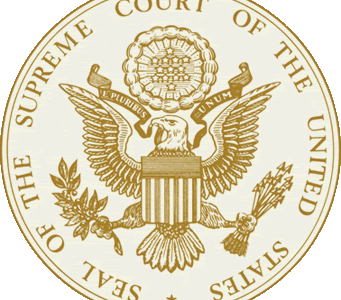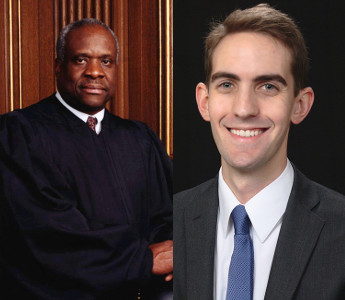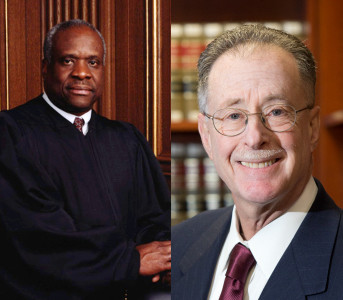Bank Markazi v. Peterson, 578 U.S. ___ (2016) (Ginsburg, J.).
Response by Dean Alan Morrison
Geo. Wash. L. Rev. Docket (Oct. Term 2015)
Slip Opinion | New York Times | SCOTUSblog
Equity and Justice versus the Separation of Powers
Bank Markazi claimed that this law violated separation of powers by, in effect, having Congress decide the merits of a legal dispute, which should have been resolved by the federal courts that were hearing the cases. Both lower courts upheld the law, and the first ray of hope for the Bank was the Supreme Court’s grant of certiorari, despite the opposition of the United States at both the certiorari and merits stages.
To a non-lawyer trying to decide who should win just on the equity, the Bank’s chances did not look very good, and on April 20, 2016, the Supreme Court, in an opinion written by Justice Ruth Bader Ginsburg, with only Chief Justice John Roberts and Justice Sonia Sotomayor in dissent, upheld the constitutionality of § 8772, thereby removing a major barrier to the victims collecting at least some of their judgments.
Those were the atmospherics, but on the legal issues, there was substantial agreement between the two opinions, although in their conclusions they were very far apart. All of the Justices agreed that Congress could pass laws changing the existing law and make those changes generally applicable to pending cases, provided it did so clearly. They also agreed that Congress could not pass a law in a pending case that said something along the lines of, “The Court is directed to enter judgment for the plaintiff,” or that “The plaintiff wins and defendant loses.” To do so would usurp the judicial role and improperly expand that of Congress. Nor could Congress change the law in a way that re-opened a case in which there was a final judgment not subject to further appeal. There was also agreement that Congress could write laws that applied to a limited category of cases, at least in those cases in which only the Government was adversely affected by the change in the law. The issue here was where § 8772 fell on that spectrum.
The Bank asserted that one reason the law was invalid as a judicial usurpation was that it applied to only one case. The majority disputed that, pointing out that there were many separate cases here in which there were individual judgments, although for collection purposes they had been consolidated. As the dissent argued, the outcome should not depend on how that consolidation is characterized because the class of cases is plainly limited. Surely if Congress enacted a law directing the actual outcome in fifty cases, it would be no more (or less) constitutional than if it applied to only one lawsuit. The majority also said that the law was written more broadly than to cover just the cases identified in it, which may have been literally true, but no one identified any other situations besides this one to which it would actually apply.
Section 8772 was further defended on the ground that the courts had to make a number of findings for the victims to prevail, which would diminish the congressional usurpation. Again, the dissent seemed to have the better of this argument, showing that the theoretical factual disagreements were just that. Moreover, there is surely no hint that Congress thought it was leaving holes in its effect to pierce the investment company shield. Finally, the majority (minus Justice Clarence Thomas, who declined to join this part of the opinion) pointed to the fact that this case involved a law affecting the assets of a foreign government and that the President, who supported the law, has traditionally had broad powers in the area of foreign affairs. The difficulty with this argument is that the law affected only assets in the United States, and there is nothing in the majority’s rationale that would produce a different result if the Bank of America was seeking to shield its assets under existing law and Congress overrode that law just as it applied to it. But in the end, as the dissent pointed out, had these other factors not been there, the majority would have come out the same way.
Bank Markazi had relied heavily on United States v. Klein,3 in which the Court overturned a statute that would have resulted in a court denying the plaintiff’s claim by changing the law applicable to his case and others similar to it. As the citations in the majority opinion to various scholarly works discussing Klein show, its rationale is not entirely clear and it has been cited, but not relied on by the Court, to strike down a federal law since then. One fact about Klein that may have mattered then and perhaps now: the law that Congress overturned was a decision of the Supreme Court, whereas here the applicable law was a provision of the New York U.C.C. that placed a limit on reach assets such as these. Although the majority did not make a major point of the fact, Justice Ginsburg did observe at several places that § 8772 did not change the substantive law under which the victims obtained their judgments, but only the law governing how they can collect them. That distinction has a kind of intuitive appeal, but it overlooks the fact that, when a plaintiff seeks a money judgment, it is the money not the judgment that is the goal, which suggests that there may be less to that distinction than at first appears.
The majority cited many cases that, in one respect or another, respond to the Bank’s objections and support the authority of Congress to enact laws directly affecting the outcome of pending cases. But, as the dissent points out, many of them involve cases in which the United States is the party being disadvantaged by the change in the law that the United States has enacted, which seems quite different from changes in laws that affect private parties. That does not fully respond to all the cases cited by the majority, but it captures many of the most significant.
I have long been bothered by Congress stepping in and passing narrow laws that benefit or burden one or a small number of parties. The dissent shows that this was a major concern before our Constitution was adopted and many state legislatures engaged in actions that were judicial in nature. I am less troubled by the claim that the judiciary is being harmed by being told how to decide a case because judges have no independent interest in deciding a case under one law rather than another. My concern is that what happened here will repeat itself in other circumstances in which the equities were quite different, for example a large company persuading Congress to change a law in a way that appears to be general, but applies only to its advantage and to the disadvantage of an individual plaintiff. In some respects that is what happened here, and while the individual could make an Equal Protection claim, it would be decided under the rational basis test, with little likelihood of success. There is no doubt that the victims and their lawyers here went to Congress with a plan to change “some technical law” so that the Government of Iran could no longer shield its assets from the deserving families. What chance did Iran have of being heard in that legislative fight, and what Member of Congress (or President) would want to be on record as supporting Iran against the victims of terrorism? This argument is the one that was made at the end of the dissent, and it is one that the majority does not try to answer.
- Bank Markazi v. Peterson, No. 14-770, slip op. 1 (U.S. Apr. 20, 2016).
- Iran Threat Reduction and Syria Human Rights Act of 2012, 22 U.S.C. § 8772 (2012).
- United States v. Klein, 80 U.S. (13 Wall.) 128 (1872).
Recommended Citation
Alan B. Morrison, Response, Bank Markazi v. Peterson, Geo. Wash. L. Rev. Docket (Apr. 21, 2016), http://www.gwlr.org/bank-markazi-v-peterson-equity-and-justice-versus-the-separation-of-powers.





